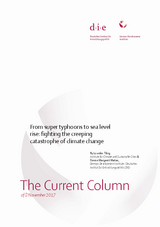From super typhoons to sea level rise: fighting the creeping catastrophe of climate change
Tibig, Lourdes / Denise Margaret MatiasThe Current Column (2017)
Bonn: German Development Institute / Deutsches Institut für Entwicklungspolitik (DIE), The Current Column of 8 November 2017
Bonn, 8 November 2017. Today marks the fourth anniversary of super typhoon Haiyan hitting the Philippines. It was the strongest tropical cyclone ever to make landfall. The world continues to be devastated by even more extreme weather events; this year alone saw floodings in Bangladesh, India, Nepal, Vietnam and the United States; droughts in Somalia; Hurricanes Harvey, Irma and Maria in the Caribbean and the U.S.; and just last week, Storm Herwart hit Germany, the Czech Republic and Poland. The growing frequency of natural disasters leaves governments around the world with little choice: They must fulfil their commitment to act on climate change on all fronts, even as they continue to ramp up disaster risk reduction efforts. Moreover, they must not only address rapid onset events but also slow onset events, which are a more silent but equal – if not more dangerous and pervasive – threats to lives, livelihoods and ecosystems. Slow onset events (SOE) associated with the adverse impacts of climate change include “sea level rise, increasing temperatures, ocean acidification, glacial retreat and related impacts, salinization, land and forest degradation, loss of biodiversity and desertification,” according to the definition of the 2010 Cancun Agreements. The United Nations Framework Convention on Climate Change (UNFCCC) has recognized the negative, even fatal impacts of these SOEs. The Pacific island Fiji – this year’s host of the UN Climate Change Conference in Bonn (COP23) – was in fact the first nation to ratify the Paris Agreement, as they already struggle with rising sea levels. However, separate studies by our institutes, the Institute for Climate and Sustainable Cities and the German Development Institute / Deutsches Institut für Entwicklungspolitik (DIE), show the immense gaps in research efforts in the Philippines and other developing countries, which are at the front lines of climate change impacts. Yet, reliable research data is needed to address the challenges of SOE. Most of the currently published research on SOEs has been conducted in and focused on North America, Europe and Australasia. In Asia, only a fraction of countries – such as Japan, China, India and Malaysia – have done extensive research on SOEs, which include attribution and confounding factors. In the Philippines, surveys by three local state universities across the archipelago show that the available literature on climate change in their regions and provinces need to be improved. The lack of data reflects the lack of investments in research and development work of state universities and colleges nationwide. Several confounding factors, such as land use change and overexploitation of natural resources, also make it difficult to attribute many of the local findings to climate change. Moreover, most of the SOE research worldwide have been conducted by the life and physical sciences, while social sciences contributed the least. In the case of local studies in the Philippines, the analysis disregards disaster and climate change perceptions of marginalised sectors such as the indigenous people (IP) communities, women, children, differently abled and senior citizens. At the national level, policies need to better reflect realities on the ground aided by sound research, both from the natural and social sciences. Researchers, as well as development and extension workers of local academic institutions must be financed and capacitated in order to help communities improve their climate and development plans and access the appropriate response opportunities. Planners and other officials should utilize research not only as additional socioeconomic agenda items in development plans, but as a trigger to national and local policy direction. Moreover, to holistically address the risks of slow onset events and other adverse impacts of climate change, governments must develop not just policies but pathways for climate finance to accelerate the reach of locality-led and science-backed initiatives in particular. COP23 must deliver responses on loss and damage, adaptation and finance in response to the ever-growing urgency of climate action. The Warsaw International Mechanism on Loss and Damage, established within two weeks after Haiyan struck the Philippines, must finally be financed. On the other hand, financial institutions and other stakeholders must also help to establish further measures to manage the risks of slow onset events. Countries must likewise ramp up their climate action so as to stay below the 1.5 degrees Celsius warming threshold set out in the Paris Agreement. The most vulnerable states, regions, countries must be given a fighting chance to survive and thrive amidst extreme weather events and creeping impacts alike.
Lourdes Tibig is Researcher at the Institute for Climate and Sustainable Cities, Denise Margaret Matias is Researcher at the German Development Institute / Deutsches Institut für Entwicklungspolitik (DIE)

